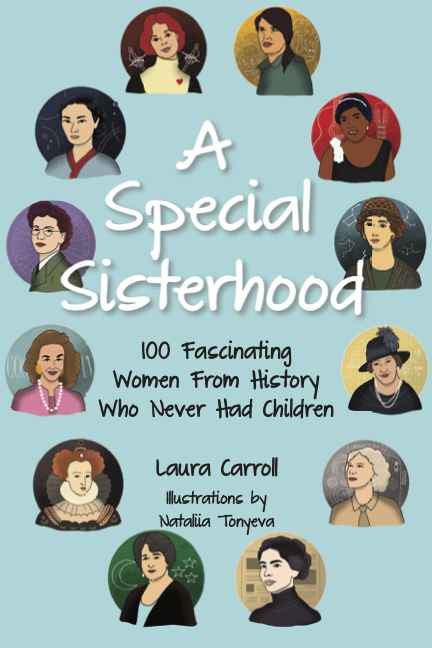Review by Ellyn Ruthstrom
If you need any proof that women without children have accomplished amazing things, then you might want to take a look at Laura Carroll’s A Special Sisterhood: 100 Fascinating Women from History Who Never Had Children. The book doesn’t analyze why the women remained childfree, but the compilation instead focuses on the accomplishments of these talented and brilliant women.
To give you a taste of what is included, you’ll find noted political leaders such as Queen Elizabeth I, known for her 45-year reign in England. Jeannette Rankin was the first white woman elected to the U.S. House of Representatives in 1916, before federal suffrage for women passed. In 1968, Shirley Chisholm became the first black woman elected to the House, and in 1972, she ran for the Democratic nomination for president. Manuela Saenz was a South American revolutionary war hero, who fought alongside her lover Simón Bolívar.
Jane Addams was a social work reformer who established the settlement house movement in the U.S. Dorothy Height was known as the mother of the Civil Rights movement. Nellie Bly was a famous newspaper reporter who covered many different social problems, and Gwen Ifill was a news reporter and anchor with public TV for decades. Bessie Coleman was an early aviator and established many firsts as a black woman in the field. Decades later, Sally Ride became an astronaut and only after her death in 2012 was it revealed that she had a long-time female partner after she divorced her husband.
Carroll’s book includes many creative women who have not been mothers. Edith Wharton led a privileged life and was the first woman to win a Pulitzer Prize for her writing. Octavia Butler’s science fiction is known worldwide for her visionary representation of a future world. Greta Garbo and Madeline Kahn will be remembered for their great movie roles. And Celia Cruz and Jessye Norman’s voices were one-of-a-kind in their own musical genres.
Carroll even mentions some of the Greek and Roman goddesses who chose to remain virgins. Minerva is the goddess of wisdom, the arts, medicine, and sometimes of war to the Romans (known as Athena to the Greeks). She was called “the goddess of a thousand works” and was considered the wisest of the Roman goddesses/gods. Artemis is the goddess of the hunt and wilderness and is often depicted with her bow and arrow. She protects women before they marry and during childbirth. Hestia is the goddess of the hearth and home, so we can see it is possible to honor the sanctity of one’s home and not become a parent!

